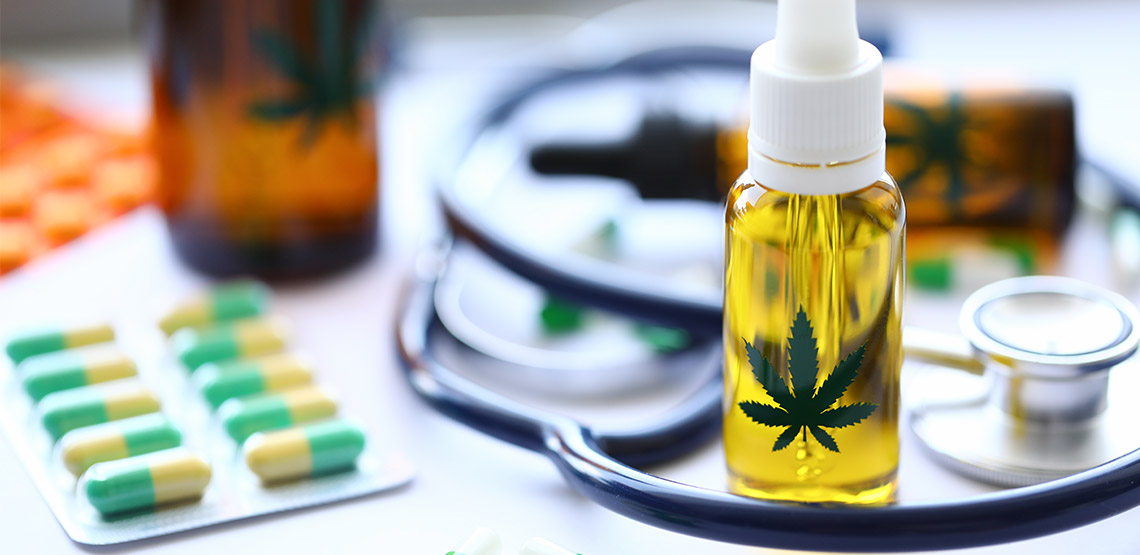What Is CBD Oil Used For?
Cannabidiol (CBD) oil, which is a compound derived from the marijuana plant, has been gaining immense popularity among consumers in the United States as marijuana becomes legal in more states.
Manufacturers incorporate CBD oil into food, dietary supplements, cosmetic products and medications. CBD oil has various health benefits, but it lacks the psychoactive effects of tetrahydrocannabinol (THC), so users don’t get “high” from using it.
What Is CBD Oil?
CBD oil is a product that consists of cannabidiol combined with an inert carrier oil of varying concentrations, such as hemp seed oil or coconut oil. It’s also available in the form of sublingual (under-the-tongue) sprays, gummies and capsules.
Proponents of CBD oil claim the product may help treat or alleviate joint pain, Crohn’s disease, insomnia and Parkinson’s disease among other illnesses. However, there is limited scientific evidence supporting the health claims of CBD oil.
The lack of scientific evidence has not halted the growth of the CBD oil market in the United States as it has been growing at a dramatic rate over the past few years. ArcView Market Research and BDS Analytics have predicted that the CBD market has the potential to grow to over $20 million by 2022.
What Is the Purpose of CBD Oil?
CBD oil can be used for a wide array of purposes, from helping boost appetite to promoting sleep to minimizing anxiety, stress and depression. It’s also believed to have skin health benefits, including keeping psoriasis and eczema away and delaying signs of aging, such as wrinkles.
While there is limited research, a few studies have shown that medical marijuana that contains THC can ease some of the adverse effects of cancer therapy such as nausea during chemotherapy. Some cancer patients have reported the same benefits from using CBD oil, but there is no scientific evidence to support this claim, so it’s not recommended as a substitute for other treatments.
What Are The Benefits of CBD Oil?
Lowers Stress and Anxiety
There is growing evidence pointing to the capability of CBD oil to lower the level of stress hormones in the body and the body’s natural response to stress. According to a study published in the Journal of Psychopharmacology in 2010, CBD has anti-anxiety benefits. An oral dose of 400 milligrams of this cannabis product significantly minimized signs of social anxiety disorder in participants.
Another 2011 study available in Neuropsychopharmacology demonstrated that a dose of 600 milligrams of CBD significantly lowered cognitive impairment, levels of anxiety and speaking discomfort in social situations.
CBD may help the brain access and minimize the breakdown of essential neurotransmitters, including anandamide and serotonin, leading to relaxation and happiness.
Promotes Better Sleep
Manufacturers take sleep needs into account when extracting and processing CBD oil. This helps promote healthy sleep cycles, allowing users of CBD oil to get a sufficient amount of quality sleep.
May Treat Acne
Acne is a prevalent skin disorder that affects over 9% of the world’s population. It’s believed to be triggered by factors such as genetics, underlying inflammation, bacteria, and excessive synthesis of sebum, a greasy secretion produced by skin’s sebaceous glands.
Many recent scientific studies show that CBD oil has anti-inflammatory effects that may be helpful in treating acne.
Related Search Topics (Ads)
Reduces Pain and Inflammation
Sublingual delivery and topical application of CBD oil may reduce inflammation and help alleviate moderate chronic pain. Several animal-based studies have demonstrated that topical application of CBD oil can be instrumental in the treatment of arthritis by considerably reducing pain signals and inflammation, with few reported side effects.
Promotes Healing without a “High” or an Addiction
Unlike THC, CBD lacks psychotropic or psychoactive properties. Consequently, individuals can use the product to treat an ailment without the worry of getting high. Additionally, it’s a non-addictive product, so the same dose can be used throughout treatment without the fear of developing an addiction.
Side Effects of CBD Oil
Digestive Issues
There have been claims that CBD oil may lead to an array of digestive problems, including nausea accompanied by vomiting and diarrhea.
Fatigue
Some studies have attempted to understand the effects of CBD oil on sleep. They have found that high dosages of CBD help users gain adequate sleep while lower doses promote wakefulness.
However, in both cases, some users report feeling worn-out after exposure to CBD oil. Professionals advise against using CBD oil before or while handling heavy types of machinery or driving.
Dry Mouth
Dry mouth is a common side effect of cannabis product usage. CBD is believed to trigger a reduction in saliva production after exposure, especially when it comes to sublingual delivery.
Immune System Issues
Researches have linked CBD with a reduction in the body’s immune response. This may result in a surge in the risk of contracting infections, particularly in individuals with compromised immune systems including individuals with diabetes, HIV and Down’s syndrome.
Liver Damage
Studies have focused on identifying the relationship between CBD and seizures and have shown that the chemical may lead to liver damage. This relationship seems to be dose dependent — the higher the dose, the higher the risk of liver damage.
How to Use CBD Oil
While CBD comes in many forms, many people prefer to use the bottled oil commonly called a tincture as it is convenient and provides fast-acting relief. These concentrated formulas can be added into food/beverages or applied topically to the skin or under the tongue. When using a tincture, it’s always important to shake the bottle properly before each use.
To add CBD oil to your food or beverage, simply add the recommended dose into your snack or drink and consume it.
If you want to treat a skin condition or inflammation, you can put a drop on the affected area and gently rub it in. You can also add a few drops of this concentrated formula to your skincare product or lotion.
To take this chemical sublingually, put the recommended drop under your tongue and breathe in slowly and deeply via your mouth and then breathe out through your nose. Allow the CBD oil to stay under your tongue for about 60 seconds before swallowing and taking a drink.
Experts believe that using this product sublingually is the most effective; however, it’s important to find a mode of delivery that works for you.
Conclusion
CBD oil seems to be an effective solution in the alleviation of symptoms of numerous health conditions including anxiety, stress, depression, sleeping difficulties and acne. Given the fact that research continues to reveal the health benefits of this natural product, it’s expected that the CBD oil market will continue to increase in the future.


